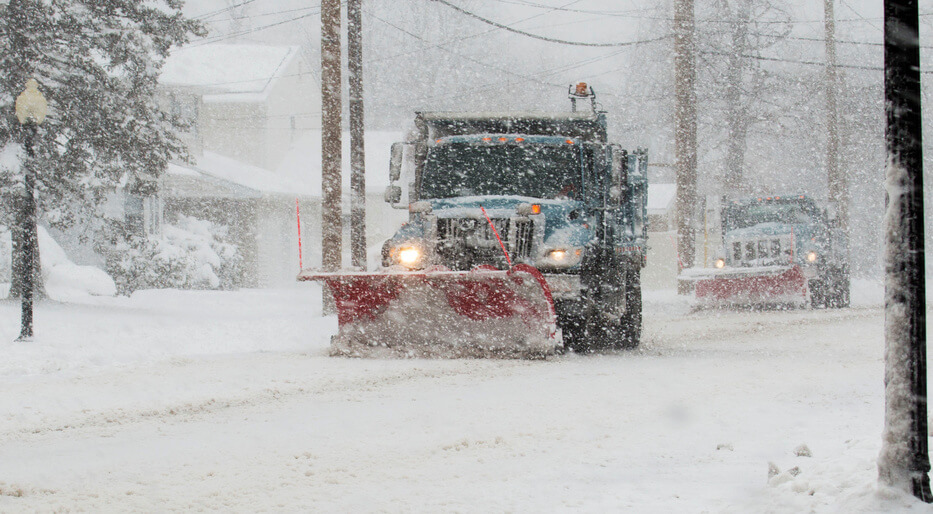With Winter weather around the corner, employers should make sure they understand and are in compliance with all federal employment laws.
Snowstorms—and other types of emergency situations—can disrupt business, so employers should be up to date with current employment laws related to matters such as handling workplace closures, payment of wages to employees and leave (time off).
Fair Labor Standards Act
The Fair Labor Standards Act (FLSA) requires employers to pay nonexempt (hourly) employees only for hours that employees actually work. For that reason, an employer is not required to pay nonexempt employees if the employer is unable to provide work for those employees due to a closure due to weather.
An exception to this rule exists when nonexempt employees who receive fixed salaries for fluctuating workweeks have agreed to work an unspecified number of hours for a specified salary. An employer must pay these employees their full weekly salary for any week in which any work was performed.
Meanwhile, an employer is required to pay an exempt employee’s full salary if the workplace is closed or unable to open due to inclement weather or other disasters for less than a full workweek. However, an employer may require exempt employees to use allowed leave for the time.
Department of Labor Regulations
When an exempt employee chooses to stay home because of bad weather, but the workplace is open, the U.S. Department of Labor considers it an absence for personal reasons. A deduction from salary for less than a full-day’s absence is not permitted, but the employer can make a partial time deduction from the employee’s leave bank (if there is insufficient time), but no deduction from salary can be made.
Employers should be cautious deducting exempt salaried employees’ pay and consider allowing employees make up lost time after they return to work instead. This practice is not permitted for nonexempt employees, who must be paid overtime for all hours worked more than 40 in a work week.
Employers may encounter problems processing payroll during or after a storm, particularly in the case of a power outage. Most states have laws that require employers to pay employees within a certain period of time, and some states impose financial penalties on employers for each day a paycheck is late. For this reason, employers should have contingency plans in place in the event that their primary payroll system is disrupted by weather or any other adverse event.
Family and Medical Leave Act
Employees may be entitled to use certain types of leave to deal with the ramifications of a storm, and employers should remain mindful of state and federal anti-discrimination laws. Employers should ensure that all exceptions are based on legitimate, non-discriminatory reasons and are consistently applied across the workforce.
Employees are entitled to time off under the Family and Medical Leave Act (FMLA) for serious injury or health conditions caused by storm or natural disaster, such as a hurricane. Employees, or those who must care for a child, spouse, or parent with a storm-related injury or serious health condition, may be entitled to leave under the FMLA.
Employers outside of impacted areas may be affected in situations when employees are called upon by the National Guard or other agency to travel to affected areas to assist with rescue and recovery efforts. Crews from New York, New Jersey, Connecticut, Arkansas and Minnesota and many other states, for example, traveled to North Carolina to assist with efforts following Hurricane/Tropical Storm Florence in September. Time off for military time should be properly allowed under various federal statutes.
USERRA
The Uniformed Services Employment and Reemployment Rights Act (USERRA) may apply to employees who are members of emergency services organizations, such as the National Guard or a Reserve unit. USERRA prohibits discharging, denying initial employment, denying promotion or denying any benefit of employment because of a person’s membership, performance of service or obligation to perform service in uniformed service.
Private, nongovernmental employers are not required to pay reservists during the period they are on active duty. While some employers have a policy that pays reservists the difference between their regular salary and their military pay, employers are under no obligation to do so. Employers may not charge military leave to annual vacation leave. The employee may, however, choose to use paid vacation time where military leave is not paid.
While USERRA requires advance notice of military service, there is no time limit within which notice must be given. In the event of a hurricane or other natural disaster, there may be short notice. The notice may be written or oral and it may be provided by the employee or an appropriate officer of the military branch in which the employee is providing uniformed service.
Employers should contact a labor and employment attorney to ensure that they are in compliance with all federal employment laws when dealing with disruptions to business due to inclement weather or a natural disaster.
Greg T. Rinckey, Esq. is a founding partner of Tully Rinckey PLLC, where he focuses his practice on military law; federal employment, EEO and discrimination litigation; and national security clearance representation.








